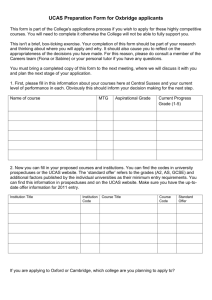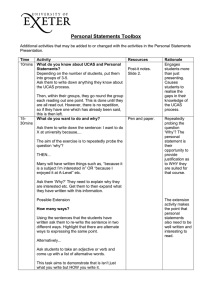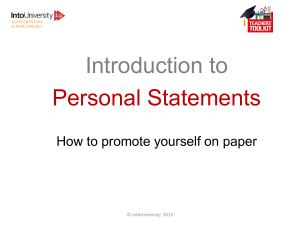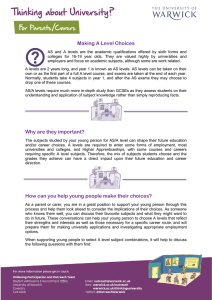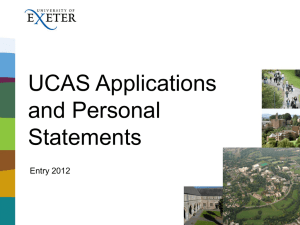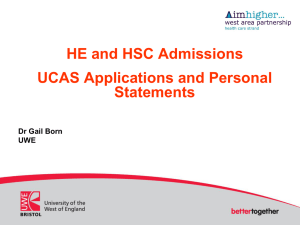UCAS Parents Evening Presentation Guide Slide 1 – Title Slide
advertisement
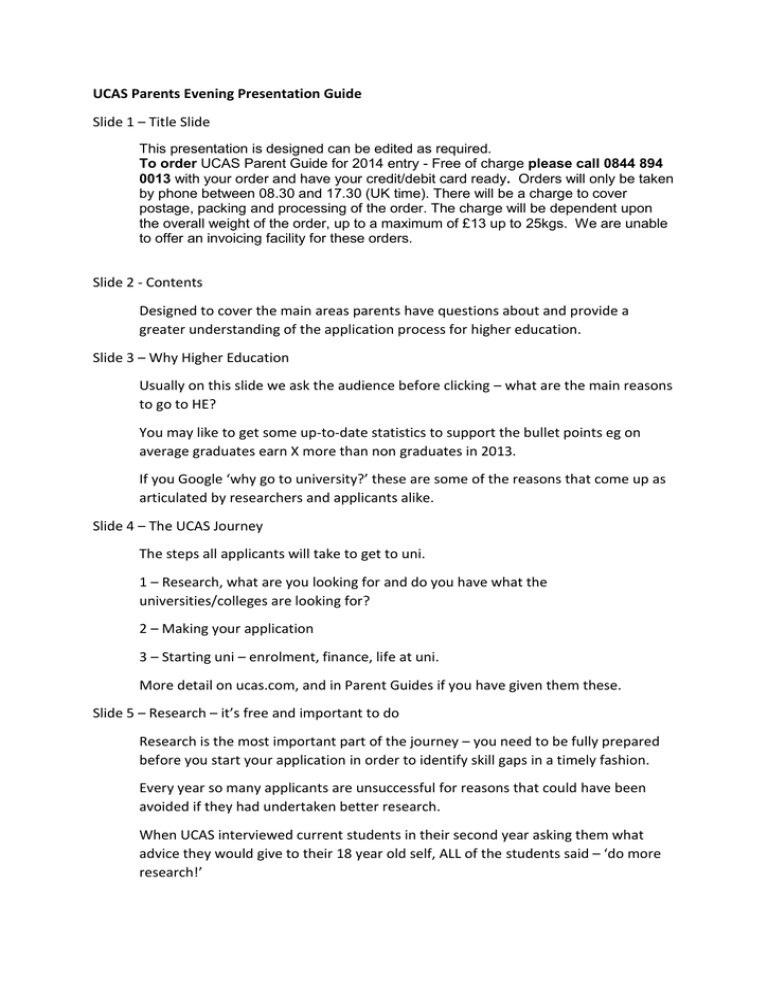
UCAS Parents Evening Presentation Guide Slide 1 – Title Slide This presentation is designed can be edited as required. To order UCAS Parent Guide for 2014 entry - Free of charge please call 0844 894 0013 with your order and have your credit/debit card ready. Orders will only be taken by phone between 08.30 and 17.30 (UK time). There will be a charge to cover postage, packing and processing of the order. The charge will be dependent upon the overall weight of the order, up to a maximum of £13 up to 25kgs. We are unable to offer an invoicing facility for these orders. Slide 2 - Contents Designed to cover the main areas parents have questions about and provide a greater understanding of the application process for higher education. Slide 3 – Why Higher Education Usually on this slide we ask the audience before clicking – what are the main reasons to go to HE? You may like to get some up-to-date statistics to support the bullet points eg on average graduates earn X more than non graduates in 2013. If you Google ‘why go to university?’ these are some of the reasons that come up as articulated by researchers and applicants alike. Slide 4 – The UCAS Journey The steps all applicants will take to get to uni. 1 – Research, what are you looking for and do you have what the universities/colleges are looking for? 2 – Making your application 3 – Starting uni – enrolment, finance, life at uni. More detail on ucas.com, and in Parent Guides if you have given them these. Slide 5 – Research – it’s free and important to do Research is the most important part of the journey – you need to be fully prepared before you start your application in order to identify skill gaps in a timely fashion. Every year so many applicants are unsuccessful for reasons that could have been avoided if they had undertaken better research. When UCAS interviewed current students in their second year asking them what advice they would give to their 18 year old self, ALL of the students said – ‘do more research!’ Nearly all courses on ucas.com have an Entry Profile which is very detailed information about what the institution is looking for in terms of their applicants – a bit like a job description! The best time to attend open days is before you submit your application – in plenty of time! For example Y12. Think about the number you are going to attend – do not go to too many as you will struggle to remember each institution and their individual features and benefits will all roll into one. Slide 6 – Other things to consider Although work experience is not mandatory, it helps enormously in being able to get the required skills and experience for university and to be able to write a good personal statement, it also helps applicants decide what they are interested in. Students that have done this kind of thing are the ones that STAND OUT FROM THE CROWD! Catering - a foot in the door. It’s frequently difficult to get work experience directly in many vocations so don’t forget about catering opportunities in eg care homes or hospitals, and charities such as Cancer Research UK who are nearly always looking for volunteers. Even undertaking roles within school or college or at your local town/village can help and be counted. Eg helping with brownies, your local church, or helping at a local gig venue. Slide 7 – How can you support the research process? Slide 8 – Key feature of the UCAS Scheme The only exception where students can not make five choices is for medicine, veterinary science/medicine and dentistry courses, where students can only make 4 choices. Students can also only apply to study one course at either Oxford and Cambridge – not both. Slide 9 – Key dates and deadlines This is a good opportunity to talk about how it is managed within your school or college – that your deadlines are as important as the UCAS ones. At this point you can also suggest to applicants to use their summer holidays wisely. Admissions test may need to be completed prior to applying. All applications received up to a deadline will be considered by universities – following the deadline it is up to a university if they wish to consider the application or not, after a deadline they are able to close courses. When an applicant applies after a deadline date the application is passed on and marked as late – many will still have vacancies and can make the student an offer as normal, but popular courses/universities will not be in this position so it would be wise to check this with universities directly first. Slide 10 – The UCAS Application Slide 11 – Making the Application To register with Apply takes 10 minutes, then the applicant is able to log in and out of their form as much as they want to before completing it. To register they will need the school/college BUZZ word – you may give it out now? Personal details – information about the applicant, nationality, nominated access (if parents wish to help and talk to UCAS or uni’s directly) and how we contact them. A section alongside this is additional information – ethnicity, care, parents’ background questions – remind parents that not all information will be used to make decisions, some is used for statistical purposes. Student finance – if filled in we’ll remind students to apply for this and pre-populate some fields in their application with data from Apply. Choices – students can make five choices. The exception is where students can only make four choices for medicine, dentistry or veterinary medicine/science courses, although the remaining choice(s) can be used for any other subject. Students can also only apply to study one course at either Oxford and Cambridge – not both. Education - is the area where most errors take place so take care eg know which BTEC you’re taking. Employment – can be marked blank, and it is paid employment only. Students send form to school/college they then send it to UCAS after the reference and checking. UCAS sends it to universities within 24-48 hours. Remind about mandatory fields, many are not so you don’t need to fill them in, and the ‘?’ contains help text for each box. Slide 12 – Personal Statement – Start Early If a student is applying to both dance and horticulture the personal statement will struggle to convey their commitment to both subjects. UCAS checks all personal statements against a library of the last 5 years and against all major websites – more info on www.ucas.com Personal statement guides are available to help a student ask relevant questions, plan their timetable for writing the personal statement and include or exclude the correct information – these are downloadable from www.ucas.com Write it early: You will need to write a few drafts Get someone to read through it Apply has NO SPELL CHECK facility! Slide 13 – Decision-making by Institutions So it’s important to make sure all aspects of your application are the best they can be, and that you have undertaken sufficient research so you know what your universities are looking for. Slide 14 – Tracking Applications If an applicant does not receive offers at the same time as their friends – this is normal. Each HEI makes offers in different ways and at different rates. Slide 15 – Replying to offers Applicants do not have to have an insurance choice if they are certain they would only be interested in one of their offers. Applicants cannot swap between the insurance and firm choices. The insurance choice disappears once they have been placed with their firm choice. Slide 16 – Extra More information can be found on www.ucas.com/extra Slide 17 – Confirmation Most exam results will be passed automatically from awarding bodies to UCAS before the school or applicant sees them to enable us to process Confirmation decisions, ucas.com displays the qualifications this is applicable to. Slide 18 – The Clearing process An applicant may add any choice that is open in Clearing. An applicant will only be able to substitute a Clearing choice when an institution declines the applicant (on screen decision reply shows as Clearing Accept Declined) which will release the applicant into Clearing. The applicant will not be allowed to withdraw a Clearing choice. If an applicant receives a Clearing ‘accept’ decision through the Clearing process they will not have the option of accepting or declining the offer in Track. More information is available at www.ucas.com/clearing. Slide 19 – How can you support the application process? Slide 20 – Find our more
